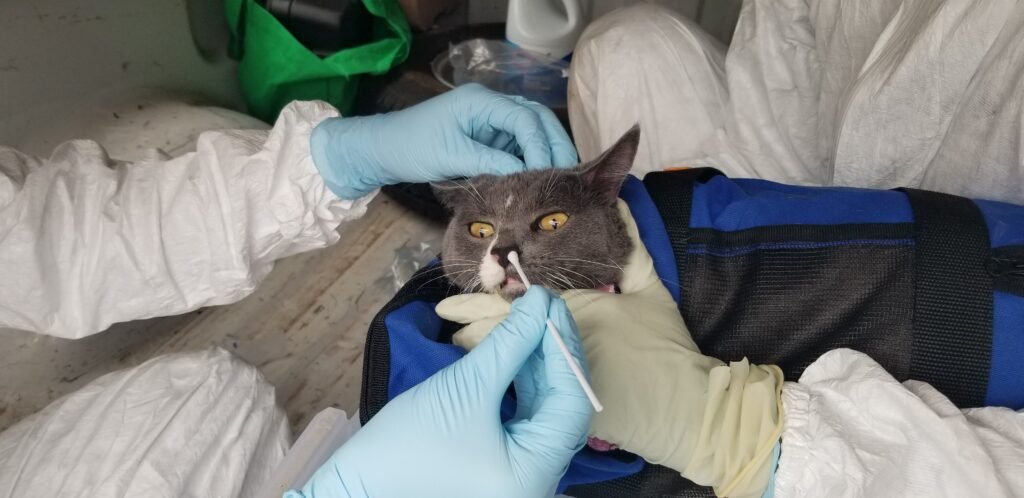Have you ever wondered if cats can get Covid-19? In the midst of this global pandemic, it’s only natural to have concerns about our feline friends. Well, the answer is yes, cats can indeed contract Covid-19. Just like humans, cats can become infected with the virus and show various symptoms. But don’t worry, in this article, we’ll explore everything you need to know about the connection between cats and Covid-19, including how it spreads, the symptoms to look out for, and the precautions you can take to keep your furry companions safe. So, let’s dive into the fascinating world of feline immunity and Covid-19.
Can Cats Get Covid-19?
Covid-19 has been a global concern since its emergence, affecting humans worldwide. As cat owners, it is natural to wonder if our furry friends can also be vulnerable to this virus. The answer is yes; cats can indeed contract Covid-19. This comprehensive article aims to provide you with valuable information about the transmission, symptoms, prevention, testing, and treatment of Covid-19 in cats. Additionally, we will explore the possible risks associated with infected humans and discuss the current state of vaccine development for our feline companions.
Transmission of Covid-19 to Cats
Cats can become infected with Covid-19 through exposure to the virus. The primary mode of transmission is through respiratory droplets expelled by infected individuals, either through coughing or sneezing. Cats can also contract the virus by coming into contact with contaminated surfaces or objects. It is important to note that while cats can get infected, they do not generally spread the virus to humans or other animals.
Cases of Covid-19 in Cats
Although the number of reported cases of Covid-19 in cats is relatively low compared to humans, there have been documented instances of feline infections. It is crucial to stay informed and vigilant regarding the health of our feline companions. If you suspect that your cat may have been exposed to the virus or is showing any signs of illness, it is essential to seek veterinary advice promptly.
Symptoms in Infected Cats
The symptoms of Covid-19 in cats may vary, ranging from mild to severe. Some common signs to look out for include coughing, sneezing, difficulty breathing, fever, lethargy, and loss of appetite. If you notice any of these symptoms in your cat, it is crucial to consult your veterinarian without delay. Early detection and intervention can help ensure the best possible outcome for your furry friend.
Risk Factors for Cats
Certain factors may increase a cat’s susceptibility to Covid-19. Older cats and those with underlying health conditions, such as respiratory or immune system disorders, may be more vulnerable to severe illness if infected. Additionally, cats living in households with Covid-19 positive individuals or in areas with a high prevalence of the virus may be at higher risk. Taking appropriate precautions, such as practicing good hygiene and limiting exposure, can help minimize the chances of your cat contracting the virus.
Preventing Covid-19 in Cats
To protect your cat from Covid-19, it is crucial to follow preventive measures outlined by health authorities. These include:
- Limiting your cat’s outdoor activities and avoiding contact with stray or unfamiliar felines, as they may carry the virus.
- Practicing good hand hygiene before and after interacting with your cat.
- Sanitizing frequently touched surfaces and objects regularly.
- Avoiding close contact with your cat if you are experiencing symptoms of Covid-19 or have tested positive for the virus.
Covid-19 Testing for Cats
If you suspect that your cat may have been exposed to Covid-19 or is showing symptoms, it is important to consult your veterinarian for advice. While there are specific tests available to detect the presence of the virus in cats, the decision to test will be based on the individual case and the veterinarian’s recommendation. Testing can help confirm the diagnosis and guide appropriate treatment measures.
Treatment for Infected Cats
When it comes to treating Covid-19 in cats, supportive care is primarily provided. This includes monitoring the cat’s vital signs, ensuring proper hydration, and providing adequate nutrition. In severe cases, hospitalization may be required. It is essential to discuss treatment options with your veterinarian, as they will be able to tailor the care plan to your cat’s specific needs.
Covid-19 Vaccines for Cats
Currently, there are no approved vaccines specifically designed to prevent Covid-19 in cats. However, ongoing research and development are being conducted to investigate the potential for vaccine development targeting feline coronavirus. It is important to stay updated with the latest information from reputable sources and consult your veterinarian regarding any potential vaccines or recommendations.
Interactions with Infected Humans
While cats can contract the virus from infected humans, the risk of transmission from cats to humans is considered to be low. However, it is still advised to limit close contact with your cat if you have tested positive for Covid-19 or are experiencing symptoms. If needed, ensure proper hand hygiene and consider wearing a mask around your cat to minimize the risk of exposure.
Conclusion
To recap, cats can contract Covid-19 through exposure to infected individuals or contaminated surfaces. While the number of reported cases among cats is relatively low, it is essential to be aware of the symptoms and seek veterinary advice if needed. Taking necessary precautions, such as practicing good hygiene and limiting exposure, can minimize the risk of transmission to our feline companions. As the situation continues to evolve, staying informed and following guidance from health authorities is crucial in protecting both yourself and your beloved furry friends.

